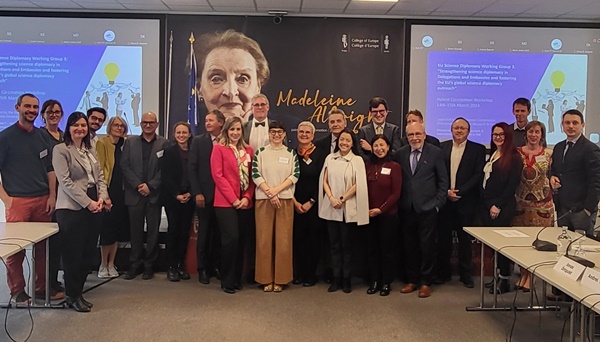CREAF and the Union for the Mediterranean promote science diplomacy to face the great regional challenges derived from the climate emergency. For this purpose, they have jointly organized the workshop “Increasing awareness of science diplomacy in the Mediterranean” and have published an open access report.
What does the Mediterranean Sea symbolise? This vast blue mass of water that bathes and influences so many diverse territories has many faces, the result of being a historical space of cultural exchanges. In fact, between the fourteenth and fifteenth centuries it gave its name to a very expensive pigment, ultramarine, which came to Europe from the lapis lazuli mines of Afghanistan by sea routes. That is to say, it came from ‘beyond the sea’ —in Latin, ultramarinus. Looking further, we discover that science is also a space of interaction where different cultures come together sharing common interests: climate action, sustainable agriculture and water management, the black economy, pollution, renewable energies, migration, future jobs and skills, and the role of women. These are some priority areas for the Union for the Mediterranean (UfM), a 42-member-state organization that supports science diplomacy as a way to achieve cooperation between southern and eastern Mediterranean countries and Europe and to provide answers to major regional challenges. In order to make this novel discipline noticeable, the UfM and CREAF organised the virtual workshop “Increasing awareness of science diplomacy in the Mediterranean”, held in 27-29 October 2021. This event was a blatant exhibition of diversity, with 100 participants from 24 Mediterranean countries and from areas as wide-ranging as research, diplomacy, public policy, education, international organizations and the private sector.

Why do we need Science Diplomacy in the Mediterranean?
This workshop focuses on the Mediterranean region –which goes beyond coastal limits– because it is considered a climate change hotspot, suffering extreme weather events, food and water scarcity, biodiversity loss, air and water pollution and new health impacts, among other effects. Even though we might suspect these challenges are just a scientific issue, we should remember science is based on cooperation, policies, resources and shared knowledge, all of which require a social approach. The necessary interpersonal skills to meet, talk and understand other people fall under the realm of diplomacy. As a nature-based solutions (NBS) expert, CREAF embraces climate action in the Western Mediterranean, pursuing research excellence and social awareness and influencing public policies. Partnering with an intergovernmental organization such as the UfM, CREAF contributes to creating spaces for scientists, policymakers, and diplomats to dialogue and find multidisciplinary solutions to global challenges. 
In the Mediterranean, scientific and cultural diplomacy are two sides of the same coin that must go hand in hand given the shared Mediterranean values and identity. Scientific cooperation can yield broader benefits: building trust, enhancing capacities and skills, sustainable development, gender equality and peace. MARGA GUAL SOLER, assessora experta en Diplomàcia Científica del CREAF
Female voices in Science Diplomacy
One of the session’s most notable aspects was the matter of the role of women in public policy and decision-making processes in parliaments, ministries and science organisations. To add insult to injury, women also suffer from imbalanced power distribution in negotiations and leadership positions, and from a gender gap in scientific research. This lack of gender neutrality worsens geopolitical, health, economic and environmental crises for females. 
80% of people displaced by climate change are women because their roles in society make them more vulnerable. They are even less likely to survive a disaster because they don’t take the fastest route to exit: they take their evacuation time looking for their kids and for their parents. They’re also more likely to experience poverty and have less socioeconomic power. ALICIA PÉREZ-PORRO, coordinadora científica del CREAF
The topics and initiatives that were discussed at the workshop are described in full detail in a report published by the UfM and CREAF. After you read it, bring yourself to reflect on what does a shared Mediterranean identity mean. Is it about climate? People? Cuisine? It is not a question of homogeneity, but of jumping into the same boat of knowledge and understanding in order to face the regional crises that threaten to sink us. The Mediterranean, a blue bond beyond the sea.








